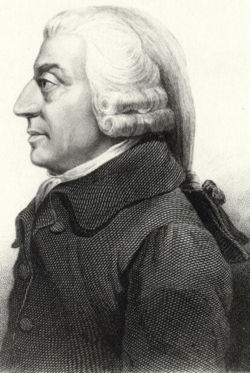Difference between revisions of "Adam Smith"
| Line 1: | Line 1: | ||
| − | [[Image:Sigentha.jpg|right]] | + | [[Image:Sigentha.jpg|right|thumb|250px]] |
'''Adam Smith''' was a Scottish political economist and moral philosopher. He is considered the fundamental economist upon whose work modern [[capitalism]] is based as he advocated individual economic growth, free enterprise and free will. | '''Adam Smith''' was a Scottish political economist and moral philosopher. He is considered the fundamental economist upon whose work modern [[capitalism]] is based as he advocated individual economic growth, free enterprise and free will. | ||
Revision as of 07:06, April 11, 2007
Adam Smith was a Scottish political economist and moral philosopher. He is considered the fundamental economist upon whose work modern capitalism is based as he advocated individual economic growth, free enterprise and free will.
Philosophy
His most famous concept was that markets guide economic activity and act like an "invisible hand" - allocating resources through prices, which rise when there is a shortage of a commodity and fall when it is plentiful.
One of the key figures of the intellectual movement known as the Scottish Enlightenment, he is known primarily as the author of two treatises: The Theory of Moral Sentiments (1759), and An Inquiry into the Nature and Causes of the Wealth of Nations (1776).
His The Wealth of Nations was one of the earliest attempts to study the historical development of industry and commerce in Europe, as well as a sustained attack on the doctrines of mercantilism. That work helped to create the modern academic discipline of economics and provided one of the best-known intellectual rationales for free trade, capitalism, and libertarianism. It continues to greatly influence the writings of economists.
Biography
Smith was born in Kirkcaldy, Scotland in 1723 and was raised by his widowed mother. Smith entered the University of Glasgow at the age of fourteen and then attended Balliol College at Oxford for six years until he graduated at the age of twenty-three. Adam returned to Scotland, and delivered a series of lectures which were very well-received. Smith was appointed first chair of logic in 1751 at the University of Glasgow and later then chair of moral philosophy in 1752. In 1764, Adam Smith left the academy to tutor the young Duke of Buccleuch. They lived and traveled in France and Switzerland for two years. The duke had given his teacher a comfortable life pension, so Adam Smith retired to Kirkcaldy and began writing his book, An Inquiry into the Nature and Causes of the Wealth of Nations. In 1778 Smith was appointed to a post as commissioner of customs in Scotland and went to live with his mother in Edinburgh. He died there on July 17, 1790, after a painful illness and was buried in the Canongate Kirkyard, Royal Mile, Edinburgh. Smith is hailed as the one who discovered the Invisible Hand, and explained the theoretical bases of free enterprise.
Legacy
Starting March 13, 2007, Smith's portrait is on the back of the British £20 note. He is first Scotsman to feature on a currency issued by the Bank of England.
Links
- Economics Lecture One
- Libertarian thinking
External links
- Biography at the Concise Encyclopedia of Economics
- Life of Adam Smith by John Rae, at the Library of Economics and Liberty
- The Celebrated Adam Smith by Murray N. Rothbard; full text of Chapter 16 of An Austrian Perspective on the History of Economic Thought, Vol. I and II, Edward Elgar, 1995; Ludwig von Mises Institute 2006
- Smith's works
- An Inquiry into the Nature and Causes of the Wealth of Nations by Adam Smith - at Project Gutenberg
